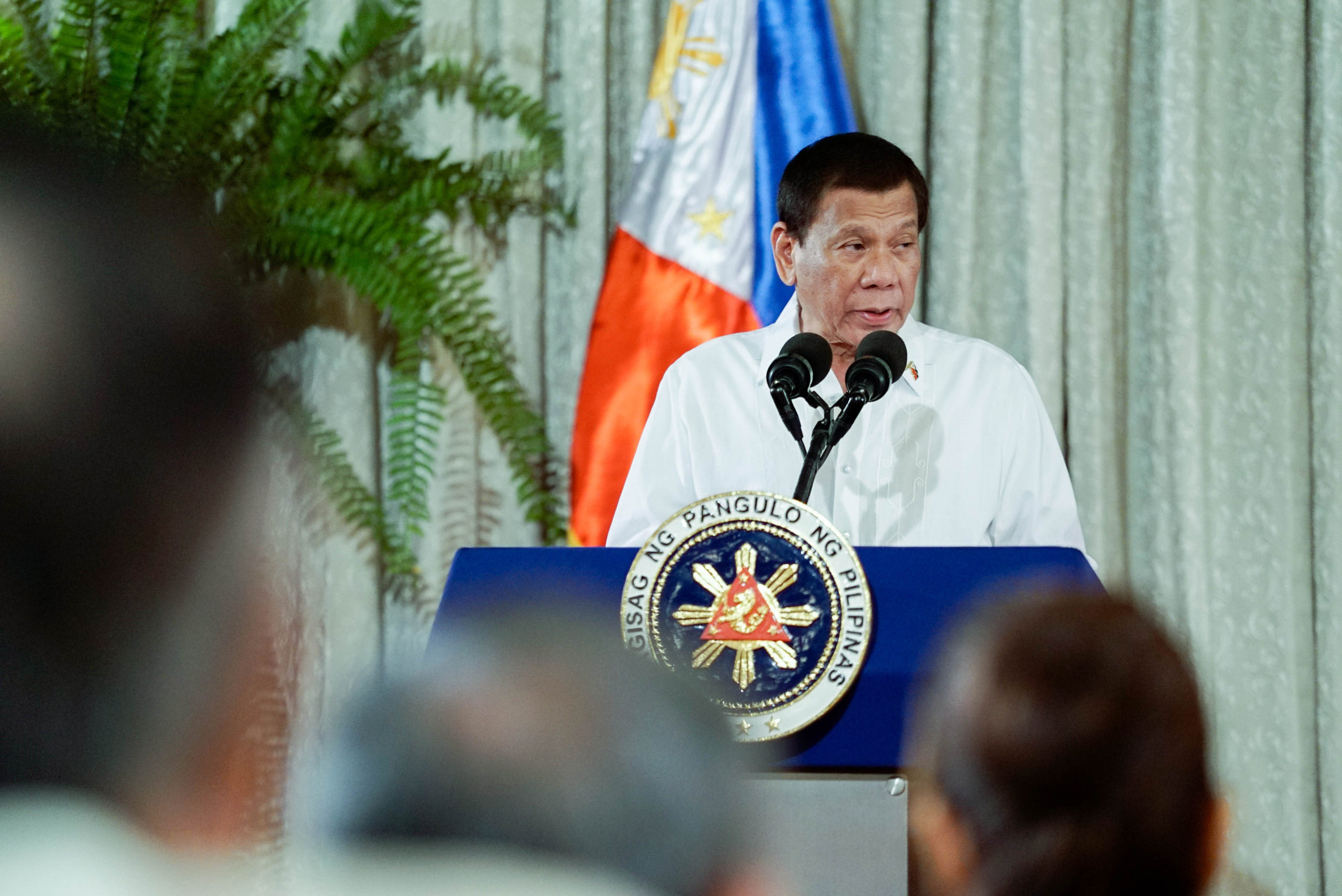

President Rodrigo Duterte delivers a speech during the oath-taking ceremony for newly appointed government officials at the Malacañan Palace on Jan. 8, 2020. KING RODRIGUEZ/PRESIDENTIAL PHOTO
Iran has fired dozens of missiles from its soil into two military bases inside Iraq where US forces were stationed since returning to the strife-torn country in 2014 when Islamic State militants swept through Syria and Iraq.
It was a retaliatory strike after a US drone attack that killed a revered Iranian general in Iraq. The US has defended its preemptive action against Iranian Maj. Gen. Qassem Soleimani by claiming he was planning to attack American interests in the region.
Iran has gained considerable influence in Iraq since the ouster of Saddam Hussein and his Sunni-dominated government in late 2003 and following a protracted civil war in Iraq. It is now controlled by a Shia-led government.
It appeared the Iranian missile attack was a face-saving operation because it did not provoke Washington to strike back. There was minimal damage and there was NO American or Iraqi casualty.
US President Donald Trump, in response to the missile attack, said he was considering crippling sanctions against Iran, but did not announce any military action. He concluded that Iran might be standing down after the retaliatory strike.
Did Iran deliberately miss to avoid an escalation, and the acoustic attack was simply a show to project an image of strength? Iran’s state media claimed 80 US lives were lost in the overnight attack, but Western media did not report any casualty following the missile barrage.
Back in Manila, the Duterte administration wasted no time seizing the moment to hog local headlines, as spokesman Salvador Panelo irresponsibly and prematurely announced that the Philippines would take the side of the US should Filipino workers get hurt.
There was a high probability that Filipino workers in Iraq would be affected because many of them worked inside military bases where US troops were deployed. There was also a large number of Filipinos in Erbil where Iranian rockets rained overnight.
However, no other country in the Middle East, which may be directly affected by a conflict, has made a statement to support any side. Not even Lebanon and Syria have openly thrown their support to Iran. Saudi Arabia, Kuwait, Oman, Qatar and United Arab Emirates did not voice support for the US. Everyone seemed to be praying the tension between the US and Iran would simmer down.
Not even in Europe, where the US can count on a traditional ally, the United Kingdom, to announce support. Other NATO allies are on standby, but refused to make comments.
In Asia, Japan, a close security partner was silent. Australia was perhaps too busy putting out fires.
So, what was Panelo’s real motive?
Perhaps, it was to convey to all our “kababayan” President Duterte’s great love and concern for more than a million OFWs in the Middle East.
These workers, after all, contributed $5.4 billion to the local economy in terms of remittances from January to October last year, accounting for a fifth of total remittances for that period.
Many Duterte administration officials have also scrambled to fly to Middle East, and the defense department sought to deploy two battalions from the Army and Marines and puny assets to evacuate Pinoys.
Duterte’s grave concern for the safety of workers is very noble and laudable, but impractical and too expensive. It reveals poor planning and an amateurish course of action.
The Philippines thinks of itself as a superpower at par with the United States, Russia or China, and wanted to act as one.
First, the military has very limited capability. It has two landing platform docks (LPDs), two C130 Hercules transport aircraft and just one C295 to ferry OFWs home.
Based on government estimates, there are more than 6,000 Filipino workers in Iraq and nearly 2,000 in Iran. The government ordered a mandatory repatriation of workers in these two countries after Iran fired missiles into Iraq this week.
Second, there was no international coalition of forces in place unlike in the first two Gulf Wars in 1990 and 2003, when many Arab countries and NATO allies joined the United States in a war against Saddam Hussein of Iraq.
And what would be the incentive for Arab countries to allow foreign troops from a small country like the Philippines on their soil now, even for a humanitarian mission?
The Philippines does not have military agreements with any Middle East country for such purpose. It could also take time for the Department of Foreign Affairs to secure permission to land military aircraft and dock ships, as well as bring boots on the ground.
Host countries might as well do the job with better logistics and a larger force. Like the Philippines, countries in the Middle East are very jealous of their own sovereignty.
Besides, these Middle Eastern states do not see the urgency that the Philippines feels. Manila is exaggerating its reactions at the moment.
Third, it is more practical to move workers to safety with available assets in the area, than bring them home. Former foreign secretary Albert del Rosario has proven that in the past in Libya. Secretary Roy Cimatu had a similar experience during the Arroyo government. The Philippine embassies together with DOLE welfare officers are no strangers to these operations.
Besides, during massive evacuations in Libya, Kuwait, Lebanon, Iraq and Syria, all countries involved helped each other. The Philippines can tap ASEAN support like in the past. Manila also has an agreement with Moscow to airlift distressed Pinoys.
The Philippines is not alone. It has numerous friends and it has a lot of experts with vast experiences in the volatile region.
So please, stop acting like a superpower. Be practical.